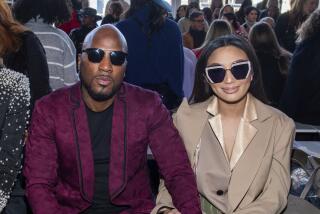Visitation hearing for severely disabled woman examines the basics of parenthood
Judge Frederick C. Shaller faces a daunting array of questions this week as he decides whether a paraplegic woman who communicates largely by blinking has the right to see her triplets.
What is a parent? What is communication? What is a relationship? Does a child, not yet 5, benefit from visiting a mother who neither moves nor speaks? Can that woman — Abbie Dorn, 34 — think, feel, love, want? How is it even possible to know?
During testimony in Department 46 of Los Angeles County Superior Court, Dorn’s ex-husband Dan talked publicly for the first time last week about why he is fighting to keep the children away from their mother and maternal grandparents — or at the very least control access to them — and about what motivates him as he struggles to raise his family.
“I would be happy to do anything to make sure that the children were happy … as I have for five years,” Dan told Shaller. All he wants, he said, is for litigation to end so that he can move on with his life. What he does not want is to be “forced to do anything by the court for a woman in a vegetative state.”
Dorn was healthy until the June day in 2006 when she gave birth to daughter Esti and sons Reuvi and Yossi at Cedars-Sinai Medical Center. A string of medical errors during delivery starved her brain of oxygen; today she is in a minimally conscious state, according to a neurologist who examined her as part of the ongoing court case and testified via video Thursday.
Dan and Abbie have divorced, and her parents care for her in their South Carolina home. As her conservators, they are asking the court to order Dan to take the children from Los Angeles to Myrtle Beach for regular visits. They believe that Dorn desperately wants to see her children and has the constitutional right to do so.
Susan Cohen believes in miracles, prays that her daughter will improve and wears a bracelet with the Yiddish inscription Tracht gut vet zein gut, “think good, it will be good.” Dan believes that his ex-wife is “100% not there” and that it is damaging to the children to hear what his attorney Vicki J. Greene described as “false hope.”
“I’m not refusing to have visitation with their mother,” he testified. “I want it to be on my own terms where I am not having to co-share the responsibilities of raising the children with my former mother-in-law, where it’s me giving the children information the way I see it.”
Dan took the children to see Dorn for four days in December, a visit that was part of unsuccessful settlement discussions and was kept secret even from the judge. Until that time, Dorn had not seen Dan or her children for three years. She had not held the triplets in her arms since the day they were born.
Dan agreed to the December visit, he said, because he thought “it would end this whole court thing.” In addition, he told Shaller, “everyone’s said [Dorn] has gotten better, better, better, so I wanted to see for myself.”
The visit, like nearly everything else in the acrimonious case, was described in wildly divergent terms in court last week.
Cohen said the children were happy to see their mother, that they made her art projects and showed them to her, that they touched her and smiled at her and were unafraid of the woman who bore them, despite the hospital bed and feeding tube and therapy sessions and silence. Dorn, Cohen said, greeted her children with a smile.
“They were very very affectionate and loving,” Cohen told Shaller. “They called her Mommy.”
Dan acknowledged, when pressed, that the children enjoyed the visit and have asked to see their mother again. Yossi requested a picture of his cousins, four boys and a girl he has never met but whose images he saw on the Cohens’ refrigerator.
But Dan testified that the children handled the visit well because he was there at every moment. And their behavior changed, he said, after they flew home to California. Reuvi began wetting the bed three times a week; Reuvi and Esti became clingy.
When questioned by Dorn’s attorney Lisa Helfend Meyer, however, Dan said that he had not sought help for the children from mental health professionals or their pediatrician after the visit, that he never mentioned any changes to the children’s court-appointed attorney and that no one at their school noted deterioration in the children’s behavior.
He also acknowledged that he had not told Esti, Reuvi and Yossi anything about their mother until they were nearly 4 years old and that he did little to prepare them for meeting Dorn three months ago.
Dan did not show the children pictures of their mother, he said, or talk about their life together before the events that left her so seriously disabled. He never read the lengthy report prepared by a court-ordered psychologist, who evaluated the children and their extended family over several months.
“You told the children that their mother would not know if they were present or not?” Meyer asked in court.
“That’s correct,” he responded.
“What did you do besides telling them she’s basically not there?” Meyer asked.
“I told them she loved them very much, that a doctor made a mistake and, because of that, she can’t move and she can’t talk, and there’s not any interaction you can have with her,” Dan recounted. “I’m pretty sure I also said she’s blind.”
But Dorn is not blind, according to neurologist Dr. Angela Hays, who examined the disabled woman and testified that she can perceive sounds and images. “She does perform an eye blink maneuver to attempt to signal yes or no answers,” Hays said, although “it was difficult for me to get her to do that reliably.”
The hearing, which began Thursday, is to continue this week. At its end, Shaller will decide whether to order visitation temporarily until a full-blown trial can be held. A trial date has yet to be set.
Dan blames his mother-in-law for the ongoing litigation. “I’m here today because of Susan,” he told Shaller. Her actions have “been a constant: trying to ruin my reputation, bankrupt me and take my children.”
Cohen said she is fighting for visitation on behalf of the children — her own daughter as well as her grandchildren.
“Their mother does love them,” Cohen testified in tears. “She loves them very much. I don’t want these children to ever, ever believe they were abandoned.... Our home is always open. We would never throw a child away.”
More to Read
Start your day right
Sign up for Essential California for news, features and recommendations from the L.A. Times and beyond in your inbox six days a week.
You may occasionally receive promotional content from the Los Angeles Times.







